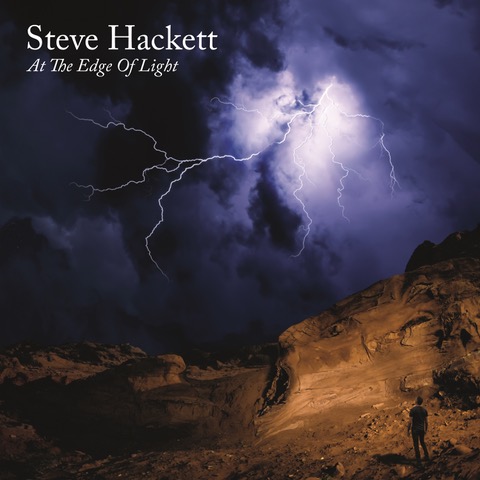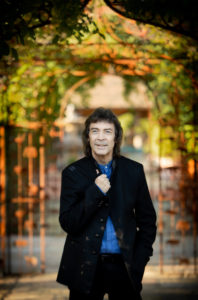
For the recent Christmas holidays, Steve Hackett and his wife, noted writer Jo Lehmann, travelled to Ethiopia to explore the nation’s culture in a direct, intimate way. It was an eye-opening journey that saw the couple witness the resilience and diversity of the nation and its people, which have recovered demonstrably since the famines of the 1980s although poverty and deprivation is still in evidence.
The sights and sounds were indelibly impressed upon their hearts and minds, as have the things the couple has witnessed and experienced over their nearly decade long relationship [Lehmann is Hackett’s third wife], and both reaped the benefits of these enlightening and mind-broadening journeys, which are reflected within their art – Jo with the written word, Hackett through his musical compositions.
A keen observer of the world, both from afar through media, and up close and personal through similar trips, progressive rock icon Hackett is cognizant of the fact that humanity is going through a particularly tumultuous time, with its baser nature seeming to show through more and more through violence, intolerance, and outright hatred coming to the fore.
Looking to make sense of it, and perhaps contribute some needed light and balance, Hackett is set to release his latest album, At the Edge of Light, on Jan. 25 worldwide, across multiple digital platforms and physical forms.
“We spent Christmas in Africa indeed, and it was an experience that was unrepeatable in its significance. We both like to write, and we like to meet people and we love to go to the outer reaches of the world. It was entirely fascinating and also the worst roads I have ever encountered in my life. But it’s fascinating meeting people who have no idea what you do, what your life is like and you have no idea what their life is like. I was hoping to capture a lot of the music there and get a sense of it, and I was surprised because it was not what I expected; I thought it would be mostly drums, but it was so different there and it was something different from one tribe to the next,” said Hackett of his Ethiopian expedition.
“Initially I was a reluctant traveller, but music became my calling and being a musician, part and parcel of that is you get to travel to all sorts of places. My wife loves to travel – she wants to see the whole world. So, we have been to some extraordinary places; some of them are on the tour maps for musicians and many are not, such as India. I haven’t played a single gig in India. I have been to China recently and Australia where I was playing shows, but we took time to explore, especially in Australia, because we wanted to be close to the sort of Indigenous heartbeat of the country.
“So, yes, absolutely, travel and the experiences while travelling informs every inch of what I do. And over the years I have developed these friendships; I happen to have friends all over the world, and many of them are very talented musicians and singers, and a number of them appear on this album. I try to look at it that there’s a kind of fellowship that runs through the music business. And the travel does broaden the writing, I think, and puts me in touch with people and instruments I wouldn’t normally see. So, this album in particular, is part travelogue, it’s part storytelling, it’s many things – and it’s pan-genre. I find with the act of just getting on an airplane, already I start to write different things, because I feel I am no longer bound by the chains of what’s expected of me locally.”
The album’s debut single, Under the Eye of the Sun, is offered up as an antidote to all the crisis, darkness and inhumanity that seems rife within the world today, as it looks at the wonderment and beauty created over millions of years within the natural environment, how the shapes and structures created by erosion and other monumental phenomena seem destructive but are actually creating beauty instead.
“It’s a nature-based idea, celebrating nature’s achievements and monuments. And although those things are static, in reality you get tremendous energy from them. Having visited in recent times Monument Valley in America, then the Uluru [aka Ayers] Rock in central Australia and Petra in Jordan, you could be standing in the same place as deserts have a remarkably similar look. It is indeed all under the eye of the sun, and they look as if it was impossible that nature’s hands would make these amazing shapes and valleys and formations. Obviously was has happened over millennia is soil erosion because or wind, rain and all the rest. Where once there were oceans, now there are deserts, and it creates these marvelous things and people stare at and nobody knows why,” Hackett said.

“What I was trying to do with that song was give you a time-lapse film for the ear, rather than for the eye. It’s like if you had a time machine and we able to fast forward and rewind through time to see these amazing things being created. The reason why I did this incredibly energetic track was I was trying to describe something that was static, but there had been lots of movement around it – all of the unseen sculptors had been at work on all of it. I wanted to get that idea across, of all that energy over all that time, but compressed, as it were.”
The experiences of travel in recent years have taken him back to his first big journey as a child, when his family moved to Canada from a great Britain that was still suffering from the effects of the Second World War. He now looks at travel through the same eyes of wonderment and openness that he did as a kid.
“When you spent your first few years growing up in the concrete jungle of London with the bomb sites and all of that, and then suddenly you are sailing on the Atlantic Ocean and you’re seeing icebergs for the first time. And then you are taking the Canadian Pacific Railway with the observation dome right across Canada. I was fascinated with the entire experience,” he said.
“And then there were these things that looked like upended Christmas puddings with cream on top, which were the Rockies. Driving through them on the train was extraordinary, before arriving in Vancouver – I can’t tell you how mind-blowing that was as a kid. It was just great, and the climate was amazing. We literally lived 30 seconds from Jericho Beach just around the corner. I though I had died and gone to heaven as a kid.”
The problem was, the excursion didn’t last, as whatever family venture was supposed to happen in his new home, failed a few short years later, and he endured the trauma of being ripped away from the place he loved, and taking the same trip desolately in reverse. This was what led to the disdain for travel that only relapsed in recent years, when he allowed himself to look upon it with the same approach as he did on that first epic journey to Canada.
The second single from the album is a Gospel-injected masterpiece that demonstrates Hackett’s ability to meld multiple influences together with his progressive rock milieu to form a song that is truly evocative and memorable. Lyrically, he explores the historical reality of slavery, particularly in the United States during the Civil War era, and those that fought against the vile institution – hence the title Underground Railroad.
“It’s a subject that has fascinated me ever since I was standing in West Virginia along the banks of the James River, and I was noticing there were these information plaques with quotes from separate sides of the big Civil Way battle that took place there. The union forces had arrived, won the battle, and the tide was turning in the Civil War because that was such a decisive battle. One person was talking about how their livelihood was ruined and then there was one quote from a slave girl which said something about seeing ‘The Lincoln’ coming in the distance. And I was intrigued by the use of the world ‘the’. I suppose to the young slave girl and her peers, it would seem as if Abraham Lincoln coming would be equivalent to as if the Messiah had arrived, by using the word ‘the’. It was incredible to see that from the point of view of somebody whose freedom had been taken away since birth,” he explained.
“I have also visited the Slavery Museum in Liverpool, England and there was extraordinary stuff, extraordinary photographs. I think it was in Wilmington, North Carolina where I was reading the story of local notables and one of them was Harriet Tubman, who had been an ex-slave and she developed what would become known as the Underground Railroad, a network that helped slaves escape north. There is also a novel written by Colton Whitehead which was recommended by President Obama, a best seller that was also called The Underground Railroad, which was fascinating and spurred the desire to write this song.
“And then putting the song together, I had been introduced to Lorelei and Durga McBroom, who famously had worked with Pink Floyd; they were able to get the concept straight away and I wanted them to give the piece an authentic Gospel feel, where it was part country and part blues, and get the imagery train rolling. It just really grew from there. And they were so quick on the uptake and have such incredible voices. It came out as a little but like Gimmie Shelter meets Salena Jones. It was a pleasure to work with them and they added such depth to the song.”
The former Genesis guitarist has been touring relentlessly for years, with a seeming inexhaustible number of agents and promoters looking to have he and his talented solo band perform. Thus far, Hackett said he has upwards of 150 gigs planned for 2019 and will hit Canada when the North American round of dates comes.
As for a set list, it will be comprised of things that should please every facet of Hackett’s fan base. There will be the performance of a significant number of songs, if not the entire album, from At the Edge of Light, as well as the whole Spectral Mornings solo album, which marks its 40th anniversary this year. And for old school Genesis fans, he and his band will be playing the Selling England by the Pound record from start to finish.
For more information on the new album, and upcoming tour dates, visit www.hackettsongs.com.
- Jim Barber is a veteran award-winning journalist and author based in Napanee, ON, who has been writing about music and musicians for a quarter of a century. Besides his journalistic endeavours, he now works as a communications and marketing specialist. Contact him at jimbarberwritingservices@gmail.com.
SHARE THIS POST:
